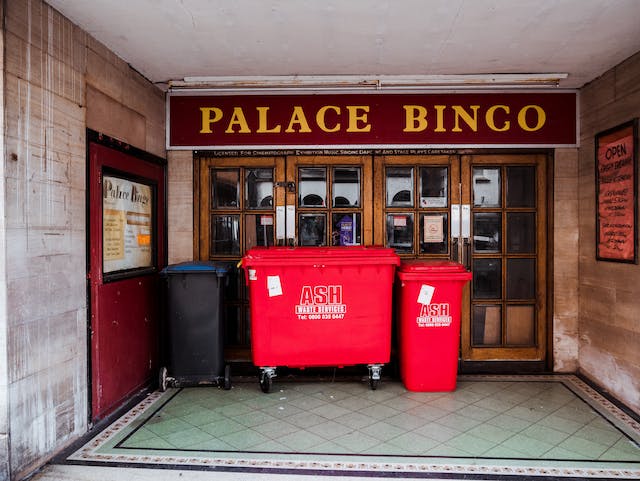Dumpster rentals offer a convenient solution for disposing of large quantities of waste during various projects, such as home renovations, construction, or decluttering. While dumpsters are versatile, there are certain items and materials that you cannot simply toss into them due to safety, environmental, and legal considerations.

Image source: Pexels.com
Understanding what cannot go in a dumpster is essential to avoid potential issues, fines, and environmental harm. We will explore the items and materials you should avoid throwing into a dumpster rental and the reasons behind these restrictions.
Materials that you should avoid throwing into a dumpster rental
1. Hazardous Materials:
Hazardous materials encompass various substances that risk human health and the environment. These materials should never be thrown into a dumpster due to the potential for contamination, pollution, and harm. Hazardous materials enclose chemicals, electronics, batteries, radioactive substances, etc. Instead of dumpster disposal, they demand specialized handling and disposal methods, often involving designated collection centers and hazardous waste facilities, in adherence to local regulations.
2. Construction and Demolition Debris
Construction and demolition debris, such as concrete, bricks, roofing materials, and lumber, should not be indiscriminately placed in a dumpster. The weight, size, and environmental impact of these materials necessitate separate disposal arrangements, often involving recycling at dedicated facilities or compliance with local waste management guidelines to ensure responsible handling.
3. Household Appliances
Household appliances like refrigerators, air conditioners, and washing machines should never be discarded into dumpsters. These items can contain hazardous components that pose environmental risks if released. To dispose of them correctly, one should remove hazardous parts following local regulations, recycle or donate usable appliances, arrange for bulk waste pickup, or adhere to specific disposal guidelines in line with local waste management regulations.
4. Yard Waste
Yard waste, including grass clippings, leaves, branches, and tree stumps, should not be disposed of in dumpsters. Despite being biodegradable, these materials require separate disposal due to their potential to generate methane gas in landfills, contributing to climate change. Rather than landfill disposal, consider eco-friendly alternatives such as composting, mulching, municipal yard waste pickup services, or complying with specific landfill regulations for responsible yard waste disposal.
5. Mattresses and Furniture
Mattresses and furniture items, such as couches and chairs, are often too bulky and unwieldy for dumpsters and can inefficiently use space. Improper disposal of these items can lead to overcrowded landfills. To responsibly dispose of mattresses and furniture, consider options such as donating them to charities or thrift stores, recycling when possible, arranging for bulk item pickup through waste management providers, or following local landfill regulations for large item disposal.
6. Flammable and Explosive Materials
Materials that are flammable or explosive, including gasoline, propane, fireworks, aerosol cans, ammunition, and more, should never be placed in dumpsters due to severe safety risks. These materials can lead to fires, explosions, and harm. Rather, consult local hazardous waste disposal facilities or authorities for safe, lawful disposal methods, stemming accidents and potential harm to people and property.
7. Biomedical Waste
Biomedical waste, such as used needles, sharps, and expired medications, should never be placed in a dumpster due to the risk of injury, contamination, and the potential spread of infectious diseases. Proper biomedical waste disposal involves utilizing specialized containers and following stringent regulations set by health authorities and medical waste disposal services.
8. Toxic and Radioactive Materials
Toxic and radioactive materials, often found in research, industrial, or medical settings, must never be thrown into dumpsters. Improper disposal can lead to severe environmental contamination and health risks. These materials require careful handling, containment, and disposal by licensed professionals following regulatory guidelines and waste management protocols.
9. Household Chemicals
Household chemicals like paint, solvents, pesticides, and cleaning agents should never be disposed of in dumpsters due to their potential to contaminate the environment and harm waste management workers. Responsible disposal involves taking these materials to designated hazardous waste collection sites or participating in community hazardous waste disposal programs.
10. Expired or Unused Pharmaceuticals
Expired or unused pharmaceuticals, including prescription and over-the-counter medications, should not be placed in dumpsters. Flushing them down toilets or drains can contaminate water sources. Proper disposal options may include participating in drug take-back programs or using designated medication locations to ensure safe and environmentally responsible disposal.
Understanding what cannot be thrown into a roll-off dumpster rental in Round Rock is vital for responsible waste management. Hazardous materials, construction and demolition debris, household appliances, yard waste, mattresses, furniture, flammable or explosive materials, biomedical waste, toxic and radioactive materials, household chemicals, and expired or unused pharmaceuticals all demand specific disposal methods to ensure safety, environmental protection, and compliance with local regulations. By adhering to these guidelines, you can contribute to a cleaner, safer environment and avoid potential legal consequences associated with improper disposal.
Related Posts:
- Construction Dumpster Rentals: The Key to Successful Renovations in Round Rock
- Orlando Residents: What To Look For In a Dumpster Rental Service
- Things You Must Consider Before Choosing Dumpster Rental Services
- How to Strategically Place Rubbish Bin Skips on Your Property
- Common Mistakes of Junk Removal